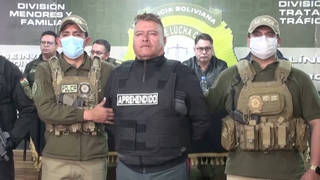
We pay a visit to Radio Gente 94.7 FM, the Cochabamba radio station that airs Democracy Now! in Spanish. Democracy Now! broadcasts on more than 250 stations across Latin America. [includes rush transcript]
Transcript
AMY GOODMAN: Of the 250 radio stations that broadcast Democracy Now! headlines in Spanish, two of them are in Bolivia: one in La Paz and the other right down the road from where we were speaking in Cochcabamba. It’s Radio Gente. I went there with Andrés Thomas Conteris of Democracy Now! in Spanish.
AMY GOODMAN: We’re standing on Calama Street, and just look up here, because we see the “G” for “Gente.” Radio Gente, 94.7 FM. And yes, every morning at 6:00, you can tune in and hear Democracy Now! en Español, the headlines of Democracy Now! in Spanish. Let’s go inside and meet them.
Radio Gente, 94.7 FM. We’re here with Juan Carlos, the director of Radio Gente, where Democracy Now! broadcasts in Cochabamba, Bolivia. And we broadcast every morning at 6:00 a.m. And it’s great to be here.
JUAN CARLOS FLORES: [translated] We didn’t know you personally, and we’re so glad that you’re here. We’ve seen you, your photo, on the webpage that Democracy Now! has. And we’re very glad that you’re here.
AMY GOODMAN: Tell us about Radio Gente.
JUAN CARLOS FLORES: [translated] Radio Gente was born on the day of the Water Wars in the year 2000, and we came out in an experimental kind of a way. And the editions was experimental, but on that day, there was quite a bit of a struggle. So, because we had to just send greetings, we had no idea that the Water War was going to happen, and so it caused a great deal of confusion on that day, and we ended up staying all day 'til 6:00 in the evening.
On that day, we were the only radio that was able to actually be broadcasting, because the government decided to shut down all other radio broadcasts by cutting off antenna access. So we have the antenna at another area, and it used to be an evangelical radio, so that gave us the privilege, because it previously had been an evangelical radio station and our antenna was elsewhere. That allowed us to be the only station that was able to keep broadcasting during that time. So we had previous experience doing press work on radio, and that day and during the Water War, there was a death that occurred, who was killed during the protest.
AMY GOODMAN: Víctor Hugo Daza.
JUAN CARLOS FLORES: [translated] Yes, we interviewed his girlfriend, and she told — she, his girlfriend, told us how — where the the bullet entered into him.
That day, there were very few media who were working, since many of the media at that time was in favor of the government during that era. So the government at that time was a former dictator, Hugo Banzer Suárez, and many of the media were associated with that government and were not wanting to be critical of that regime.
So we started to work. We were sort of baptized by fire. We had to work very quickly in a very short amount of time, because we didn't have much experience. But we had to start broadcasting in that critical situation. So that’s how we were born, during the Water Wars. And we believe that that has to influence the way that radios need to do their work in the context of a very serious political situation, here in Bolivia and throughout Latin America.
AMY GOODMAN: Juan Carlos Flores, founder of Radio Gente.












Media Options